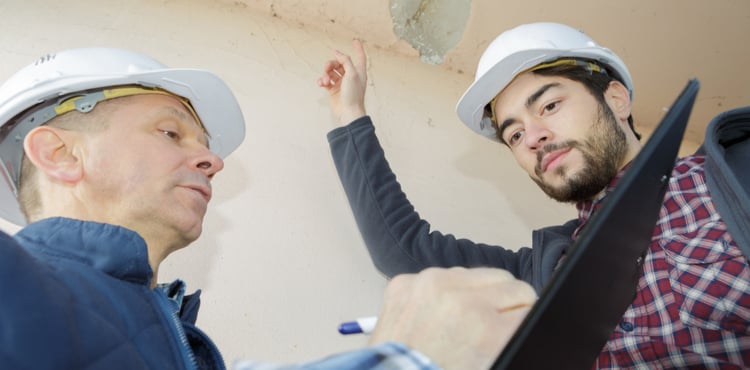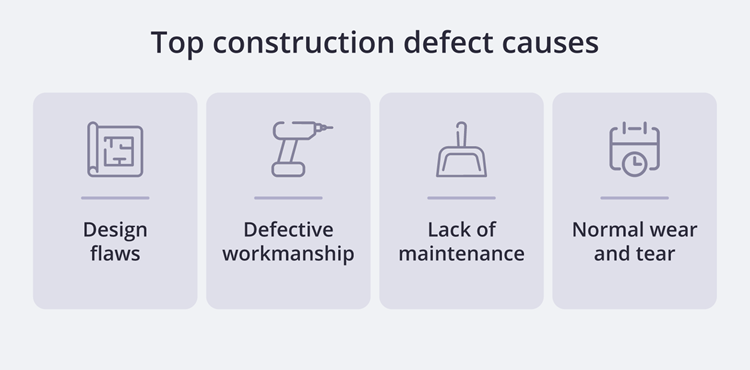What is a construction defect and are you liable for it?

From leaks that cause water damage to homes lacking proper support, lawsuits triggered by construction defects are relatively common in the construction industry. To minimize business risks for your construction company, you'll need to know the different types of defects, who can be held liable, and how construction defect insurance can help contractors safeguard against liability claims.
What’s a construction defect?
Construction defects lead to structural failures that can reduce a home’s value, such as cracked roofs, leaking pipes, or malfunctioning electrical systems, according to FindLaw. Besides lowering a home's property value, construction defects can also lead to harmful conditions for homeowners. These problems usually stem from:
Design flaws: Design professionals such as architects or engineers can make mistakes. Common problems involve construction defects that cause water penetration, inadequate structural support, or lack of structural support.
Defective workmanship: This can cause a long list of issues, such as water seepage, dry rotting of wood, cracks in foundations or walls, or electrical and mechanical problems.
Lack of maintenance: It’s wise for contractors to perform quality checks, because design flaws can also arise from poor maintenance over time. Quality checks can prevent costly repairs, lawsuits, and complaints from clients in the future.
Normal wear and tear: As structures age they will wear down over time, which can also lead to defects.
Is the construction defect patent or latent?
Construction defects fall into one of two categories: patent or latent. Here’s the difference between the two:
Patent defect: These defects are obvious problems, like a crack in the foundation.
Latent defect: These problems are often hidden from plain view and aren’t discovered until long after the project is finished.
So why does this matter to general contractors? During construction defect litigation, experts who specialize in specific construction areas will examine the defect, assess the cause, and recommend how to fix it.

Who can be held liable for construction defects?
Anyone who works on a construction project can be found liable for damages if a customer sues. Construction defect cases are usually based on agreements between the homeowners and their developers, general contractors, or subcontractors as well as between contractors and their architects, suppliers, and engineers.
A prominent example of this involved the stars of HGTV’s “Windy City Rehab.” In late 2019, a Chicago couple sued the show co-hosts Alison Gramenos and Donovan Eckhardt, as well as Eckhardt’s company, Greymark Development Group, over defective work.
According to the court filing, the couple who purchased a home for $1.36 million noticed multiple defects with the house shortly after purchasing it. This included a hallway bathroom that leaked and drained through the kitchen whenever it was used, a substantial amount of water that leaked through the exterior masonry and windows, and deteriorating or missing mortar on the exterior walls.
In another example, the Associated Press reported that actor Brad Pitt’s “Make It Right Foundation” sued architect John C. Williams, because Williams was allegedly responsible for failing to properly waterproof homes constructed for people hit hard by Hurricane Katrina. The organization reportedly paid Williams’ firm millions of dollars for architectural drawings for building more than 100 affordable and sustainable homes in the Lower 9th Ward.
According to the AP report, Williams was not held liable for damages caused by the use of TimberSIL, an experimental weatherproof wood product. Pitt’s foundation subsequently sued TimberSIL’s manufacturer for $500,000.
How construction defect insurance coverage protects your business from lawsuits
If you want to safeguard against lawsuits from unhappy clients, you’ll need the right insurance policies to avoid any coverage issues. For lawsuits over defective construction, you will likely need the following policies:
General liability insurance
For construction companies, general liability insurance covers risks such as customer injuries, customer property damage, libel, and slander.
Products-completed operations
Typically included as part of your general liability coverage, products-completed operations safeguards your business from claims that your faulty work caused a bodily injury or property damage. “Products” applies to companies that manufacture and sell products, and “completed operations” refers to companies that perform construction or installation at clients' homes or businesses.
Professional liability insurance
Professional liability insurance can cover lawsuits stemming from:
Failure to deliver promised services: If your delays affect your client’s finances, your construction company could be sued. Construction professionals could, for example, be sued for not meeting a deadline or failing to deliver the expected outcome.
Negligence in providing services: Regardless of whether you’re truly at fault, a client could accuse your company of negligence, which could result in an expensive court case. This policy would cover your attorney’s fees, court costs, and judgments or settlements.
Errors and oversights: If a client accuses you of making a mistake that resulted in financial harm to them, this policy can also cover your company’s legal fees related to work mistakes and judgments.
Builder’s risk insurance
Builder’s risk insurance (or course of construction insurance) can protect construction businesses from losses due to damage from events like fires, storms, vandalism, or on-site tool or equipment theft that occurs while buildings are under construction.
It’s a good idea to make sure that everyone working on a project is covered by a liability policy.
Where your construction company is located impacts insurance for construction defects
The laws governing the process of resolving disputes between property owners and construction professionals vary by state. Whether homeowners can file a lawsuit and when they can varies based on each state’s statute of limitations and statute of repose:
- Statute of limitations refers to the deadline by which homeowners can file a lawsuit after finding a construction defect.
- Statute of repose refers to the deadline by which homeowners can file a lawsuit even if they haven’t discovered a construction defect.
The International Risk Management Institute (IRMI) notes that liability coverage for claims alleging construction defects remains up for debate in the insurance industry and in the courts. Many states have their own definition of a construction defect and processes for remedying and litigating construction defect claims.
It's also important for general contractors to consider whether to have additional coverage for their subcontractors. According to the IRMI, the commercial general liability policy excludes coverage for property damage to the insured's completed work, and the standard CGL policy form was changed in 1986 to add a subcontractor exception to the exclusion for work performed by subcontractors.
While you may not need to purchase liability insurance for your subcontractors, it’s a good idea to make sure that everyone working on a project is covered by a liability policy. You should also understand your policy terms as the policyholder, and how the law and the insurance company have determined what qualifies as your own work. Either require it in your contracts or add subcontractors as additional insureds on your general liability policy.
Whether or not you decide to provide more coverage for your subcontractors, the best time to find the right insurance policies for your construction business is before there’s an injury or a lawsuit.
Complete Insureon’s easy online application today to compare quotes for general liability and other kinds of business insurance from top-rated U.S. carriers. Once you find the right policy, you can get coverage in less than 24 hours.